Key takeaways:
- Legal clearances are essential for protecting creative work, avoiding disputes, and fostering good relationships with location owners.
- Neglecting legal clearances can jeopardize projects, exemplified by experiences with music licensing and location permits leading to significant setbacks.
- Early organization and proactive communication with legal advisors can streamline the clearance process and mitigate challenges.
- Building trust and transparency with all parties involved enhances collaboration and reduces tension during negotiations.
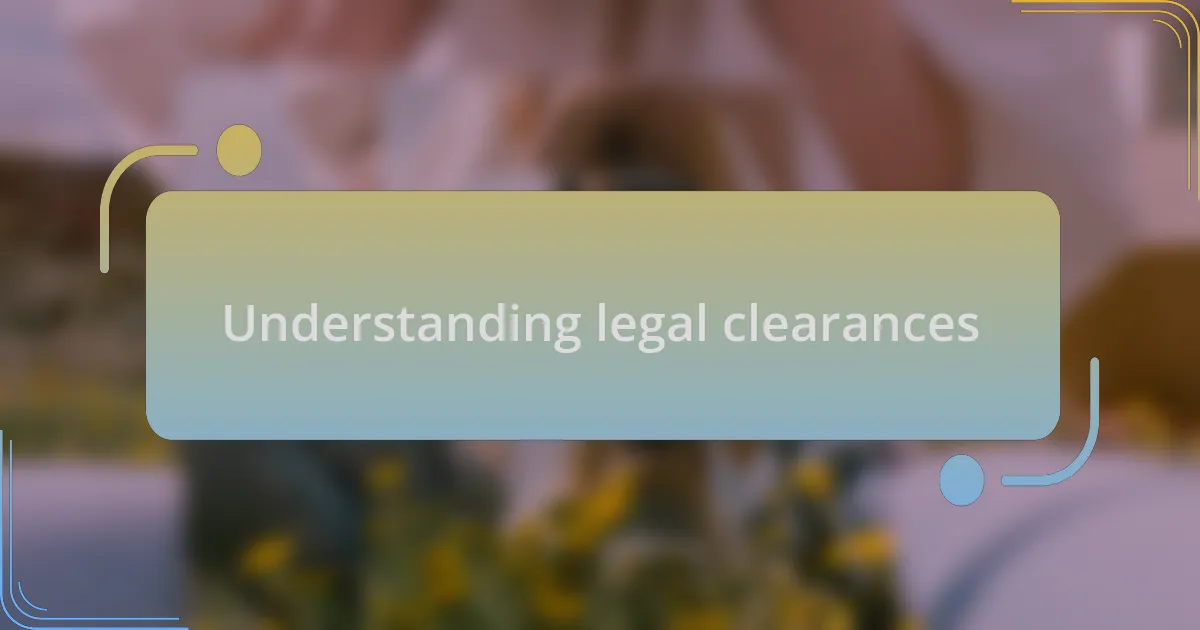
Understanding legal clearances
Navigating the world of legal clearances can feel daunting, especially when you’re passionate about your project. I remember working on my first short film—every location and piece of music required permissions that seemed endless. Each time I secured a document, it felt like a small victory, reinforcing the importance of these clearances in protecting my creative work.
Legal clearances are crucial because they safeguard against potential disputes. Consider this: have you ever thought about what happens if you film in a location without permission? The repercussions can be severe, ranging from hefty fines to legal battles that can derail your project. From my experience, obtaining proper permissions not only protects you legally but also fosters good relationships with location owners, which can lead to future collaboration opportunities.
As filmmakers, we often pour our hearts into our craft, but without understanding the nuances of legal clearances, we risk our vision. I’ve faced moments where approval delays threatened production timelines. It taught me to treat clearances as an integral part of my planning rather than an afterthought. How I navigate these processes now reflects my commitment to respecting others’ rights while pursuing my artistic goals.
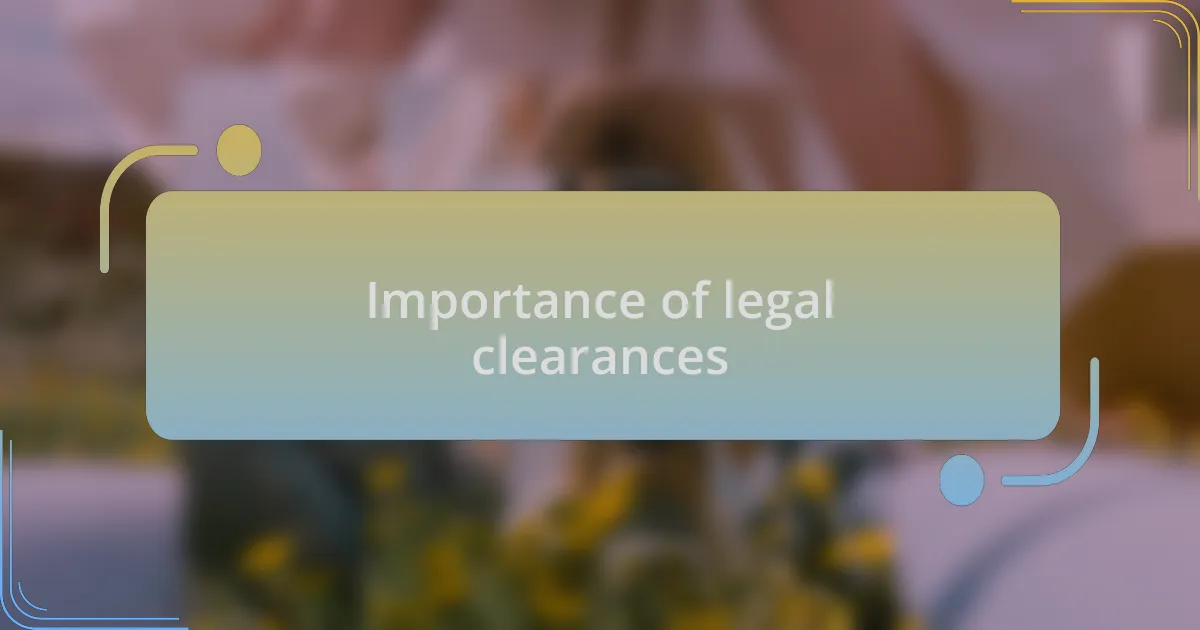
Importance of legal clearances
Obtaining legal clearances is more than just a box to check on a production list; it’s about ensuring the integrity of your project. I remember a shoot where we overlooked securing a music license. It wasn’t until the film festival deadline loomed that we learned the song’s copyright issues could jeopardize our submission. This experience highlighted how legal clearances can truly make or break the success of your project.
Moreover, these clearances create a safety net for your creative vision. I once filmed on a vibrant street fair scene without the necessary permissions. While we captured some great moments, the looming threat of legal action lingered in the back of my mind. I realized that knowing I had the right clearances granted me the freedom to be creative without fear of pushback, allowing the art to shine through.
In my journey, I’ve often wondered why some filmmakers neglect this essential aspect. Is it the thrill of “just doing it”? However, I’ve learned that the time invested in securing legal clearances pays off tenfold. It builds respect within the industry and ensures that your hard work is recognized and protected. In a landscape where content is king, having your legal bases covered is not just important—it’s indispensable.
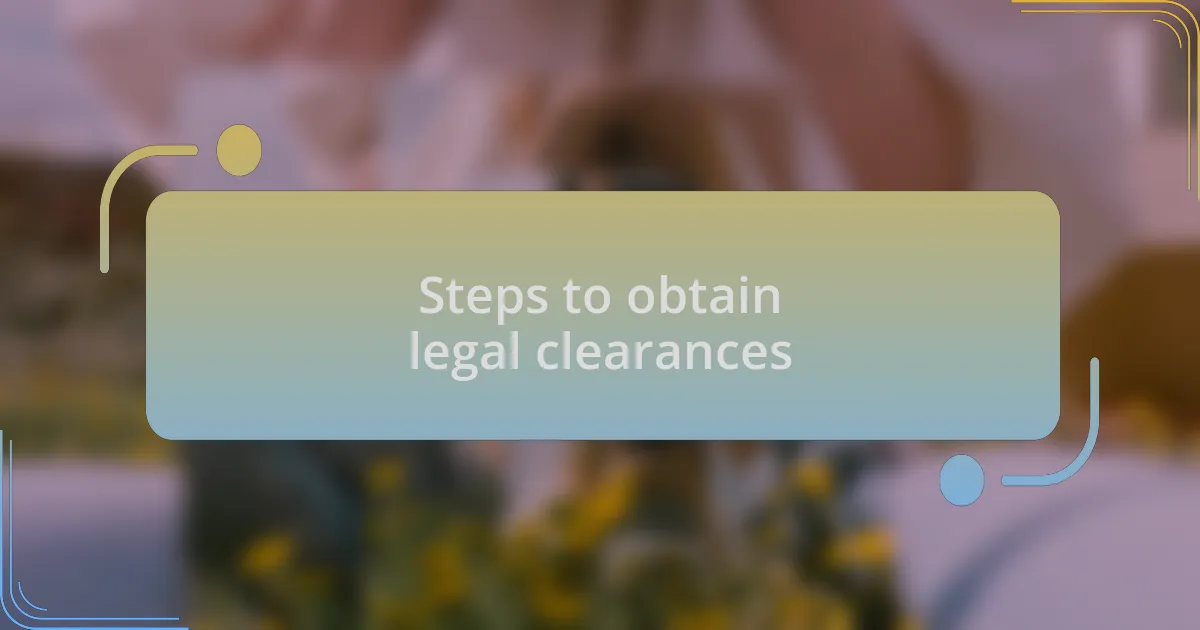
Steps to obtain legal clearances
One of the first steps in obtaining legal clearances involves identifying all potential content that needs rights or permissions. I recall working on a documentary where we used archival footage. Initially, I underestimated the importance of securing those rights and was in for a surprise when the footage owner requested a hefty fee at the last minute. This experience made me understand the necessity of mapping out all elements early on to avoid financial pitfalls down the road.
After identifying what needs clearance, the next step is to reach out to the relevant parties to negotiate terms, whether it’s talent agreements, location permits, or rights for music. I remember approaching a famous musician for their song—and while the negotiation took longer than I anticipated, the excitement I felt when they agreed was worth every moment spent. It reinforced my belief that building relationships is key; each contact can lead to smoother negotiations in the future.
Finally, it’s crucial to organize documentation and keep everything in one place. I’ve learned the hard way that misplaced contracts or communication could derail a project, especially when deadlines are tight. By maintaining a clear, organized set of files, I always feel more prepared and confident heading into film festivals or screenings. Have you ever felt that wave of panic when searching for a crucial document at the last minute? It’s not a fun experience. Trust me, a bit of organization can help you avoid that stress entirely.
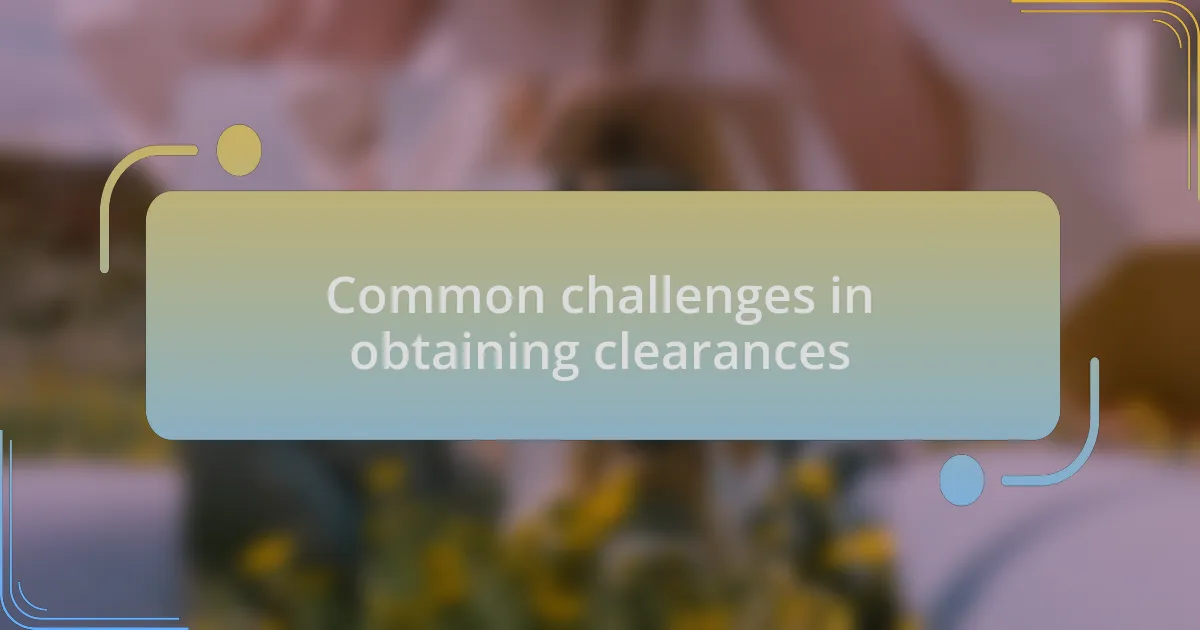
Common challenges in obtaining clearances
Obtaining legal clearances often comes with unexpected complications. I remember a project where securing a location permit seemed straightforward, but the local authority had hidden requirements that delayed our shoot by weeks. It was frustrating to realize that assumptions could lead to significant setbacks, reminding me to always double-check local regulations and guidelines.
Another common challenge is navigating the labyrinth of rights, especially when multiple parties hold claims to a single piece of content. In one instance, I encountered a particularly convoluted music rights situation where three different entities all claimed ownership of a track. Trying to untangle that mess felt like a never-ending puzzle, illustrating the importance of thorough research and clear communication from the start.
Lastly, timelines can be a major hurdle. I vividly recall a production where we needed a quick turnaround for a specific clearance. The pressure was intense, and the racing clock only added to the stress of communication delays. It made me realize that when it comes to legal clearances, starting early and planning for potential delays can save not only time but also preserve your sanity. Have you ever felt that pressure? It can really show you the value of being proactive in your approach.
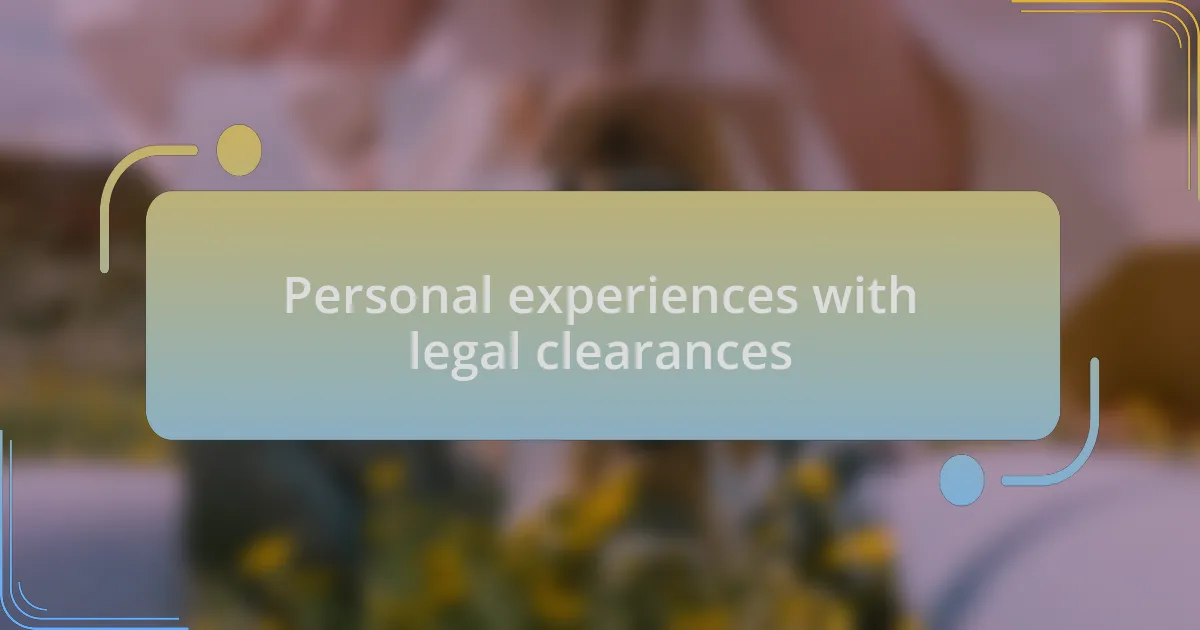
Personal experiences with legal clearances
Securing legal clearances can sometimes lead to unexpected moments of tension. I remember a shoot that required us to use an iconic building as a backdrop. Just when I thought everything was in place, a last-minute visit from the property owner raised new questions about public versus private space rights. It was a tense moment that pushed our negotiation skills to the limit, reinforcing the idea that clear and open dialogue can often diffuse potential crises.
I also recall a particularly illuminating experience with talent releases. During a documentary project, one participant hesitated to sign, expressing concerns about how her story would be portrayed. This made me stop and consider the real human element behind these documents. It’s not just about the legalities; it’s about respecting the individual’s narrative and creating trust. I found that taking the time to really discuss her fears not only eased her worries but ultimately led to a stronger collaboration. Have you ever had to navigate such delicate conversations?
Then there’s the emotional toll of waiting for clearances. I had a project where we submitted film clips for copyright clearance. The anticipation was excruciating. Every day felt like we were in limbo, unsure if we could proceed. It taught me a valuable lesson about patience and the necessity of maintaining open communication with all parties involved. Each legal clearance journey is unique, and often, the emotional experiences intertwined with them can be just as significant as the paperwork itself.
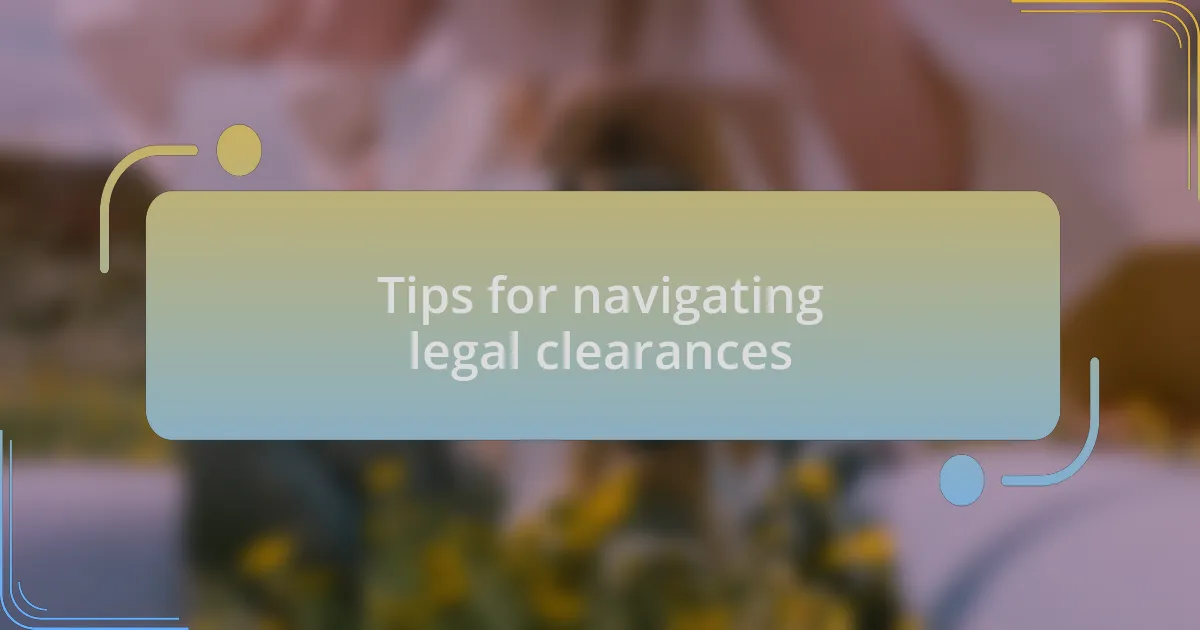
Tips for navigating legal clearances
When navigating legal clearances, I’ve found that meticulous organization can be a game-changer. Keeping a checklist of all necessary documents not only helps me stay on track but also builds a sense of confidence as I tick items off. Have you ever experienced that satisfying moment when everything aligns perfectly on the paperwork front?
Another tip is to establish relationships early on with legal advisors. I once had a project where the complexities of licensing were daunting. By reaching out to our legal team before we dived into production, we were able to identify potential roadblocks beforehand. This proactive approach transformed what could have been a stressful situation into a collaborative problem-solving endeavor. How might having a reliable legal advisor change your own workflow?
Lastly, always be transparent in your dealings, whether it’s with crew, talent, or locations. I remember a shoot where we had to seek clearance for a public event. By honestly outlining our intentions to the event organizers right from the start, we were able to forge a partnership rather than simply seek permission. Have you thought about how transparency can cultivate trust in your own projects?